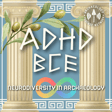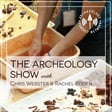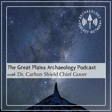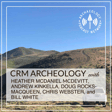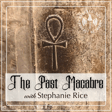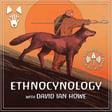Become a Creator today!Start creating today - Share your story with the world!
Start for free
00:00:00
00:00:01

Searching for evidence of neurodiversity through museum displays with Kyle Jordan (Part 1) - Ep 05
In this episode George is joined by Kyle Jordan, a Museum curator and Egyptologist born with Cerebral Palsy.
Kyle talks about his museum displays, disability in antiquity and how raising awareness of differences in the past helps to give a more realistic and wholesome perspective of the human story. As with physical differences, Neurodiversity has been an integral part of the journey so far
Transcripts
- For rough transcripts of this episode, go to: https://www.archpodnet.com/adhdbce/05
Links
Music
Your Story by MusicbyAden | https://soundcloud.com/musicbyaden
Music promoted by https://www.chosic.com/free-music/all/
Creative Commons CC BY-SA 3.0
https://creativecommons.org/licenses/by-sa/3.0/
ArchPodNet
- APN Website: https://www.archpodnet.com
- APN on Facebook: https://www.facebook.com/archpodnet
- APN on Twitter: https://www.twitter.com/archpodnet
- APN on Instagram: https://www.instagram.com/archpodnet
- Tee Public Store: https://www.teepublic.com/stores/archaeology-podcast-network?ref_id=5724
Affiliates
Transcript
Introduction to Neurodiversity's Historical Impact
00:00:01
Speaker
You're listening to the Archaeology Podcast Network.
00:00:16
Speaker
Hello and welcome to ADHD BCE, the podcast foraging through space and time to uncover the many positive ways neurodiversity has impacted the human story. From our earliest ancestors, neurodiversity has helped shape the world we live in. And on this show, we're going to be diving into some of the most enigmatic and significant events, places and people that have driven humanity from simple tree dwellers to space traveling entrepreneurs.
00:00:42
Speaker
I'm your late diagnosed neurodivergent host, George Lomas, and I'll be interviewing archaeologists, academics and neurodiversity specialists in this quest to prove that being on the spectrum is something we can be very proud of. So let's make like ADHD and gym riding.
00:01:00
Speaker
Welcome everyone to ADHDBCE Episode 5.
Museum Displays and Neurodiversity with Kyle Jordan
00:01:04
Speaker
So in this episode, rather than zooming in on a particular place, time or character, we're going to be exploring differences in the past through the medium of museum displays. It's my absolute pleasure to welcome Carl Jordan on the show to talk about his own experiences as the curator and Egyptologist with cerebral palsy, and together we're going to be exploring approaches to disability, the challenges in looking for neurodiversity in the archaeological record,
00:01:27
Speaker
and if we still have time, the importance of bringing neurodivergent perspectives into archaeology. Kyle was a Curating for Change Fellow from 2022 to 2024, working with the Pitt Rivers Museum and the Ashmolean Museum in Oxford.
00:01:42
Speaker
Kyle has produced museum displays to help highlight the universal experience of disability. And I love this quote of Kyle's that can be found on the Curating for Change website. And I really want to drop this in straight away because not only does it show what Kyle's all about, but it also echoes ADH TBC's mission. And that is, and I quote, to demonstrate how the experience of disability has been integral and in no way other to the human story. Kyle, welcome to the show.
00:02:09
Speaker
Thank you so much George, I'm really glad to be here.
Kyle Jordan's Journey into Disability Studies
00:02:13
Speaker
Great, great. Kyle, but before we dive in, would you mind giving us a little more background to yourself and your current interests and what projects you're working on at the moment? Yeah, absolutely. So as you said, I'm an early career curator and archaeologist, specialising in disability and antiquity, particularly with a focus around ancient Egypt and the Middle East, because that is where my specialty is focused, where I was I was born with cerebral palsy and my interest in disability and antiquity really began almost by fate I want to say because I was more broadly interested with ah studying ancient culture and society and ah power structures so kingship and temple structures and how they came about but in the process of doing that
00:03:04
Speaker
And doing my studies at University College London, I met a friend of mine called Teresa O'Mahoney, who started the Enabled Archaeology Foundation in the United Kingdom, which is a foundation focused towards helping disabled people get into archaeology and making the case that disabled people can do archaeology. Now, unfortunately, Teresa passed away when I was doing my studies. So in tribute to her, I decided to dedicate my undergraduate thesis to looking at a comparative analysis of approaches to disability in Greece and Egypt. And what I found was not only that there was plentiful evidence to kind of consider the topic, but also what had currently been written written was shocking to be quite blunt. And so I felt that as a disabled archaeologist, I had a meaningful role to play in helping to better the state of the scholarship and knowledge
00:04:02
Speaker
around
Exhibitions on Disability in History
00:04:03
Speaker
those things. So to talk about you know my current projects that I'm involved in, as you mentioned, I've had the privilege of working as a curator more recently. And following my work in Oxford, I've been working as a freelance curator in St Albans. So for those not based in the UK, that's a small town just north of London.
00:04:21
Speaker
and it's there that there is a museum called the Verillamium Museum that was the name of the Roman site that existed there and I've had the privilege of of just now at the time of recording wrapping up an exhibition there that's going to be installed soon and looking at health and disability in the Roman world.
00:04:39
Speaker
which I'm very excited for. And beyond that, I've just been kind of committed to writings here and there for blog posts and and academic articles on the subject of disability and antiquity, particularly looking at, to go back to that quote of mine that you read, looking at demonstrating how studies of disability and antiquity are not just about the embodiment and condition of disability in and of itself as like a mere saying of, oh, look here, we have disability.
00:05:05
Speaker
but actually thinking about how that allows us to get a deeper appreciation of humanity's story because disability is something I believe inherent to the human condition.
Cultural Perspectives on Disability Models
00:05:17
Speaker
ah kind of that's fantastic for this little section now i'd like to just touch on approaches to disability. This is something you mentioned. but What does it mean and how is it relevant to our understanding of the past? That's a really good question. So, when I talk about approaches to disability, first we need to think about How is disability being framed in the mind of the writer and then also in the reader? So more generally, when we think about disability in the contemporary world, we're thinking about what we call the models of disability. Now, for any listener who may be unfamiliar in the kind of
00:05:58
Speaker
Briefest explanation I can give for the models is this idea that you can either look at disability as an inherently medicalised thing, which we refer to as the medical model, which is to say that someone's disability is inherent to their condition, to their impairment, and therefore is a result of that impairment and therefore cannot be fixed. It can only be remedied or managed. So for example, I, as someone with cerebral palsy, because I cannot walk and use a manual wheelchair to get from A to B. If there is, say, no ramp between A to B, that is inherently on me as a disabled person and therefore not something that can be fixed and can only be kind of worked around or not at all as the case may be in some views of the medical model.
00:06:44
Speaker
But the other way of looking at disability is as a social condition, that is the social model of disability, which came about as the result of ah disability activism in the 70s, 80s and 90s in the US, UK and across the world, really, that really argues that instead of thinking as disability as inherent to the impairment, impairment is almost separate from disability. I am impaired by my cerebral palsy and the fact that I cannot walk, but I am made disabled by the fact that city planners or architects do not consider my disability in their construction and in their planning. So, you know, there could have been a ramp between A to B or there could have been a lift between A to B. And that is what's disabling me. And that's not even to go into the various kind of social conditions in which that affects people's perceptions of me and things like that. And so when we think to the past, then very often, and this is why when I mentioned earlier how I was kind of preparing for my undergraduate thesis and reading all these texts and thinking, God, this is awful. And the reason why I felt it was awful is because a lot of these authors, consciously or no, were coming scholars, consciously or no, were coming to this idea of disability inherently from a medicalised lens, which is something that I think has been impressed on many people and is inherent, unfortunately, still in many non-disabled people's thinking. And so they would inherently look at evidence of disability and immediately associate that with
00:08:10
Speaker
suffering, pain, ah just being a lesser form of life or form of existence, and therefore reducing it to just those base components and looking at impairment as the be all and end all of someone's existence rather than considering it as part of a wider kind of social interaction that we all exist in as human beings and thinking about how that might not solely influence the dynamics, but how that plays into their many other identities, because of course, human beings are not just one identity, we are an intersection of all sorts of different identities could be based on our gender or our race or our kind of ethnicity more broadly. So this is where I feel like considering approaches to disability, we are at a stage now
00:08:56
Speaker
Fortunately, where there is a growing body of scholarship that is looking at disability, not just as a category, but as an embodiment that needs to be considered in not just a social lens, but also in a cultural lens. And we can maybe get into that a bit more when we talk about how we can start to think about neurodiversity in the past as well. Does that answer your question?
Industrialization and the Medicalization of Disability
00:09:20
Speaker
Yeah, that was fantastic, Kyle. I was just going through my head then, I was just thinking about it. The disability as we say, we were brought up in 21st century, well, England, you and I, wherever you are in the Western world or wherever you are, you have this perception of disability as something's gone wrong.
00:09:39
Speaker
there you know they did that there There is a fault there and it's unfortunate for the individual. But if if you think about it in terms of you know the vastness of the human story, disability will have been there either inherent or through agency. yeah of the eighty It's not as though it's something new, obviously, just like we're talking about neurodiversity, and that's always been there. And we've always, our cultures in the past have always ah dealt with it in their own ways, whether they are tolerant or intolerant they towards it. We can not be sure with most of it, but and it seems to be that the they with with and so yeah which gets to the models of disability, the the men medical or social, when when did,
00:10:28
Speaker
this become a thing because obviously different cultures would have viewed ah disability and neurodiversity very differently. So yeah, good if you'd like to talk about that, that'd be great. Yeah, no worries. Absolutely, George. So that's a very good question because as you rightly say, in most pre-modern societies, in ancient societies, for example, these models wouldn't have really applied. and The reason why is because that medical model that I mentioned, the thoughts behind that, the philosophy behind that, if you will, really starts to emerge in modern society around the turn of the Industrial Revolution. and I say that because
00:11:07
Speaker
It's at that point where our bodies and minds are now starting to be categorised by their capacity and capability. Now that ah broadest waves of the population are being brought under a state control to to like state education for the first time, going to kind of factory workhouses for the first time, and are being managed in this way. What planners are looking for is people's ability and capacity to perform prefabricated roles. Are you able to work on the industrial line? Are you able to perform these tasks in the way that we expect to meet these quotas that we are now instituted? and so Anyone who cannot work in that factory mindset, who cannot work in that formulaic way,
00:11:51
Speaker
is being siphoned out and but is being singled out as a drain on resources, ah as a as a hitch in the grand plan of things. And it's this very kind of Victorian mindset that comes around and that has a link to archaeology because ah many archaeologists of the 19th and 20th century were also big proponents of eugenics. and Eugenics, essentially, in the
Eugenics and Its Influence on Archaeology
00:12:19
Speaker
brief estimation I can give, spiralled out from this ah social, Darwinistic take of evolution, of human evolution,
00:12:27
Speaker
ah taking a bastardization of his quote of survival of the fittest to suggest that those who were not strong enough, who were not seen as fit enough to benefit society were therefore a hindrance to it, were therefore a threat to society. When in reality what Darwin was arguing about all species was that variety within the species is what allows it to survive.
00:12:51
Speaker
if we're only ever prefabricated in one way with one body or one mind, then we're doomed to fail. But that's not how these social Darwinists took it, these eugenicists took it. And many archaeologists of the time of the 19th and 20th century, because they predominantly came from this very upper class background in the British context, and therefore had this interest in kind of creating a society in their image. They subscribed to this theory, and then they would use their archaeology to justify it. To use Egyptology as an example, Flinders Petrie, who's often credited as the father of Egyptology, and rightly so, he did start the scientific methods that underpin the discipline. But one cannot forget that if you look into his own writings and look into his own social circles, he was frequenting with a lot of people
00:13:41
Speaker
who had these eugenicist beliefs and indeed supported them like Franz Skelton and Karl Pierson at UCL, his contemporaries at UCL, whom he provided skeletons for mummies and skeletons for in order to pursue their pseudosciences of phrenology, measuring skulls and stuff like that. And that even doesn't go into his own belief of a dynastic race that must have ruled Egypt at the time because he could not he and many others of his time could not believe that Africans could have built the pyramids, basically, and things like that. But that's going into a much broader thing. But suffice it to say, that is where this kind of
00:14:20
Speaker
mindset develops within the discipline of archaeology and therefore that still unfortunately pervades to this day. And I don't necessarily think it's entirely conscious on everyone's part. I don't mean to suggest that my peers are all eugenicists, not at all, but it's kind of in the roots of the discipline, there is this data set, this this kind of approach to the material.
00:14:39
Speaker
to the very foundations of what it is that we study that hasn't really been properly disentangled, properly decoded, and so therefore that ends up influencing and pervading into contemporary thought. Because if we're led to believe that our ancestors, our collective ancestors, were all this prefabricated one kind of person,
00:14:59
Speaker
then of course people are going to believe all that's how we've always meant to be and therefore if I don't fit that mould I must be wrong, when in reality that is again, as I said at the beginning of my point, not how the ancients themselves would have looked at themselves and when we look deeper at the material and at the remains that we find we see a much greater variety than previously thought.
00:15:20
Speaker
Absolutely spot on, Kyle. That was fantastic. I think we're just going to take a quick break and I'm going to come back and dive further into the ancients and how they dealt with, they or dealt with how they experienced and lived with the disabilities and with differences, including neurodiversity. Okay, Kyle, that's absolutely fantastic and it makes perfect sense as well. I was just If we could look in the same way that we've looked at physical disability, we look at neurodiversity or neurodivergence now.
History of Mental Institutions' Impact on Perceptions
00:15:51
Speaker
Yeah, absolutely. I mean, going back to what I was saying about this kind of turn towards thinking about the body and mind along the lines of casting capability, whereas those with physical disabilities would be kind of moved to one side and kind of removed from that workforce and put into destitution.
00:16:10
Speaker
and For people with a wide array of what we might call kind of mental disabilities or intellectual disabilities or just anything to do with the mind more generally, this is where we begin to see the beginnings of the institution. This is a historical event, at least in the UK, but I imagine it, it may go under the same term in the United States and Canada and in other parts of the world as well, as well known as the great incarceration. And this essentially refers to an event, a social event, a mass social event where people who are kind of seen as being divergent in those ways
00:16:44
Speaker
are taken away from their families under the orders of the state. but This is usually through the means of say a court order or something like that and they are placed in these institutions for the safety of society. and This is the argument that's given at the time to suggest that these people are a threat to society because they do not behave in ways that are expected of them or they kind of openly question and more than the powers that we would like. And so they are taken away and removed to one side. Now, this great incarceration lasts for quite a while. And it's not really until the 80s and 90s that the institutions start to wind down. Unfortunately, to this day, they still persist, if not in terms of institutions, but in the ways in which people experiencing a mental health crisis or ah just some form of kind of mental attack, if you will, can be arrested.
00:17:32
Speaker
and put into a cell. That's obviously something in the contemporary present that's being debated in parliament, for example, in the yeah UK, but but is still something that exists. But anyway, my point is, is that that great incarceration, that taking away of people with those kind of mental differences, those kind of body mind differences,
00:17:50
Speaker
has meant that in contemporary society we've almost become detached, desensitized to what it means to live alongside and understand people with a wide array of particularly neurodivergent or intellectual disability differences and therefore when thinking about it in the past there's almost this kind of complete desensitization to the idea of the mind as a site of but feeling and thinking and being in the same way as we think about the body because there has been generally in archaeology today a very ah growing focus on the senses in archaeology which is a great thing, a wonderful thing.
00:18:29
Speaker
But very generally, if there is any consideration of the mind or disabilities concerning the mind at all, it very often has to rely on very small accounts, again, based on a very medicalised assumption of of those disabilities, so that you might see a source that says, oh, you know, they wouldn't behave themselves or
Societal Norms and Historical Views on Neurodiversity
00:18:50
Speaker
something like that. And then an archaeologist entirely well meaning again, I don't want to presume to badly on their part, but they might jump to that and say, Oh, that must be a sign of neurodivergence. So that must be a sign of a learning disability. And it's like, well, hang on, we're jumping to, to great sort of leaps there. Because again, it's still working on a, on a, on a medicalised mindset of, Oh, this person is not behaving as they should, therefore, that's neurodiversity. Whereas again, that is a, that is a modern
00:19:16
Speaker
contemporary term that was created in the context of that great incarceration, like I mentioned, and doesn't necessarily reflect how the ancients themselves may have perceived at the time. So that person that they're saying is misbehaving or socially acting out is may just very well be a person acting out. Basically, it's not predicated entirely on those conditions and moving away from that mindset, which sees any disability as a deficiency or as a a contradiction to a norm is the first big step, really, in starting to understand how disability itself, as an impairment, as an embodied experience, influences human behavior, society, and kind of just yeah the what it means to be human.
00:20:00
Speaker
but That's kind of what I'm trying to bring in as ah as a context. and kyl That's absolutely blown my mind. I had no idea. I hadn't heard of the the the great incarceration. of you Would you mind explaining a little bit more about that, please? That's yeah horrific. Yeah, absolutely. No, it it is. It's a very big part of our collective human story that has shaped a lot of the way that we think and feel in society today and therefore again is impacting how we look upon the past.
00:20:25
Speaker
I mean, in the simplest kind of summation that I can give, because again, these the effects are always more complex than can never be done justice. But the great incarceration, I mean, anyone who's read Foucault will know about his idea of the great confinement, and it kind of spins off that same idea. Now, obviously, when Foucault was talking about the great confinement, he was talking about society at large, and this does affect society at large, because Ultimately, we are all part of society. But when I say the great incarceration, I'm referring more specifically to events that were precipitated here in the United Kingdom. And I imagine again, more broadly in the world, particularly in the United States and Canada, where
00:21:03
Speaker
People who were seen as different, particularly when it comes to a divergence of the mind. So if they experienced things like mania, or if they had what we would refer to today as a learning disability, for example, were removed from their communities, they were taken away.
00:21:19
Speaker
And this was under the guise of many different initiatives and reasons that I couldn't really detail. But essentially, the argument would have been from the people in power at the time from the state at the time that these people were a threat to society, either because they were acting out or they were seen as as stirring up trouble. And so then they were removed.
00:21:38
Speaker
And they were placed in these institutions for the betterment of society. That was the argument that was given at the time. And and a lot of this, again, is just as I was saying earlier about eugenics caught up within deeper ah racialized feelings about about domination and control, who gets to call the shots basically. And to give you an idea, the man often credited with the name of Down syndrome, ah Professor Langdon Down, I believe his name was, and he referred to Down syndrome or the condition of Down syndrome or trisomy 21 as the mongoloid in bacility.
00:22:12
Speaker
So you can see the very racialized charge that's there in in his very thinking. And this was applied to many different ah kinds of divergence as well. But this was, again, used to justify this taking away of people. And what that meant was,
00:22:27
Speaker
fundamentally, the communities that had before that point pre prefaced and prioritized community-based care for these individuals and ah considered them as part of their communities. When you look at, say, pre-modern societies and records of people that are referred to the term idiot, for example, idiots is today a productive term, it's something negative.
00:22:52
Speaker
But it that wasn't always the case. at At once, it just meant a plain speaking person. And when you find, say, illustrated drawings of Jack the Idiot, or like Jack the Idiot, why, while we might read that as pejorative, in fact, in the time, it may very well have just been a statement of fact of, Oh, this is Jack, he's very plain speaking, he's, he's our local village idiots, which again, in our perception, it sounds like a native thing, but it it it may not have been meant that way at the time. There was more there was more acceptance towards yeah that. Yeah, okay. Yeah, it was it was understood as just a quirk of a quirk of their character. But from this great incarceration from this removal from society, and the many kind of ah decades and almost
00:23:38
Speaker
a century and a half of that incarceration upon people's kind of release back into society. And now you have in the UK, we call it community based living, people with learning disabilities or with neuro, extreme neurodivergence, or, or things like that. They're given health and care plans to say, okay, you can live here, this is who you live with. While that's seen as a step in the right direction, and it is because at least they are now living back in society, they're still having to go by this plan. They're still having to agree to certain timings when they do things, they still have to
00:24:13
Speaker
cooperate with caregivers to to say, oh, yeah, I will be here at this time to receive this care. And there's a whole kind of different context of how that is managed and behaved. But what that means is, is that that you have generations gap, where people haven't had to be exposed or have to really think about people who are neurodivergent or people who have learning disabilities. And so now, what exists in the contemporary present is a lot of tension between people with neurodivergence or people who are neurodivergent or people who have learning disabilities, obviously advocating for themselves trying to make their own decisions and society that still kind of looks at them as not capable of doing so and that's a real issue and it affects therefore how we look at the past because that's the perception that we hold today. and and I suppose really yeah with when you talk about well the term ADHD for example this deficit
00:25:06
Speaker
yeah a deficit and disorder. So, were we're talking about something that happened at the height or began at the height of British imperialism, I suppose. And it was all about maintaining power and getting rid, well, streamlining society to be, I suppose, more neurotypical. like So, that is a huge origins of that. And I'm just thinking like,
00:25:33
Speaker
the way they took and they did literally just got a ah court order or whatever the relevant thing was at the time and just took them out of society and locked them away. Now, if we extend that all the way through past the 80s and 90s when things started to change a little bit,
00:25:50
Speaker
The prison system is still, well, I mean, the stats are terrifying. how many I forget what it was. A huge amount of have inmates are neurodivergent or have learning disabilities. So technically, it's still going on. If you think about the unruly child at school, obviously, the school said, I mean, from personal experience, school was a nightmare. I couldn't sit in the classroom. I couldn't learn. and I struggled. I left early. It was a nightmare.
00:26:17
Speaker
I was lucky, I didn't end up with the wrong people doing the wrong things or getting caught doing some things and I didn't end up that down every bit. It's just mind-blowing to think that hundreds of years ago, I suppose now, this idea of Darwinism, evolution and perfectionism within the human race, which culture, which race and so on was the fittest, I suppose. And then the way they took that and applied that through eugenics and with this incarcerating innocent people who were displaying differences, that's still going on today, isn't it?
00:26:57
Speaker
yeah No, it is still going on today.
Ancient Communities' Inclusivity of Disabled Members
00:27:00
Speaker
And what's deeply concerning about that is, and where I think archaeology comes into this, is that with these kind of predilections about neurodivergence and difference that exist within the subtext of talking about it in kind of archaeological texts and decipherments of the past, again, bearing in mind all this context of eugenics and and hierarchy that was started within the Victorian period along the side with the development of archaeology as a discipline.
00:27:27
Speaker
ah people just come to believe that that's how it's always been, that that's how people have always felt and that therefore anyone who isn't neurotypical or who isn't physically capable must have just been always on the outside, always to the detriment of society that say, anyone who wasn't physically fit or capable must have just been left to perish, which when you actually sit down to think about it just for a moment, you realize how absurd of an idea that is. because, you know, people don't think like that. You don't just leave people to suffer if you can help it. Suffering is a condition that is imposed, yeah you know, not to get on my soapbox a bit too much. But that is something that is enacted by someone for a reason they choose to make someone suffer. And the question we should be asking is why? So in the context of my work, I've looked at why is is it that in the context of early court societies, say in ancient Egypt, so court society being the institution that arises around a king or a king like figure, why is it that we see so many people that we would describe as disabled today, particularly with physical dis disabilities like dwarfism, for example, or gigantism, or with missing limbs, and
00:28:40
Speaker
I don't want to go off on that track too much because it's not entirely what we want to focus on today. But suffice it to say, kings or any institution of power has to demonstrate its capacity to care, its capacity to to show that it has the power and means to look after someone. But it also, most importantly, on the other side of the coin, must demonstrate its right to maim, its right to harm people, to neutralize threats, quote unquote, to the established order of things.
00:29:10
Speaker
And so coming back to this idea of kind of care and new divergence, the reason of this kind of removal of people from society historically, and then this kind of phased with reintroduction today, which is still with a lot of fences and barriers around it.
00:29:27
Speaker
is to again continue this long idea of saying who is ready and who isn't to partake in our society, and if they do partake in our society, it's only on our terms, whoever our is. ah But again, that that was not always the case in in early human societies. I mentioned early court societies in Egypt as one example, but that of course is only one space in one time that doesn't necessarily line up with how everyone felt. And it's also worth bearing in mind that from our perspective in the contemporary sense, we're used to an ever present state. Unfortunately, this idea of some of powers moving, and policies shifting and affecting our lives in a multitude of ways in this globalized world we live in. But for most of human history, that's not how we lived, you know, these
00:30:13
Speaker
attitudes and ideas that we may see espoused by certain sections of the population in the past, particularly the ancient past, say if we find but very classically classicists will sometimes say Aristotle and say, oh, he says that children with disabilities should be exposed at birth.
00:30:31
Speaker
But just because Aristotle says that doesn't mean that everyone thinks that. In fact, we should consider the fact that as a Stoicism as a member of the Academy, he had actively chosen to remove himself from everyday politics and everyday society. Therefore, him saying, oh, we should be doing this is him saying what he thinks we should do, not what everyone else thinks that that they should do. And actually, what he's responding to is what he's observing at the time, which is the exact opposite.
00:30:57
Speaker
And what our archaeological record shows us is that people aren't exposing disabled infants at birth, they are they're raising them, they're looking after them, because of course they would. And it's about reconnecting with that base human need to look after one another. And this is something I always impress in my work, is that fundamentally, none of this would have come about none of this being society the world we live in would not have come together before agriculture before the first cities before the first kings we came to where we are now because larger and larger groups of people came together to look after one another and there is a reason therefore that some of the earliest graves we find in human history today are four people that we would consider to have been disabled because
00:31:41
Speaker
communities dedicated their work towards looking after each other and therefore in particular these people. And that's important to reflect upon when we think about who we today are, who we are today as a society. Outstanding, completely agree with that Kyle, that's brilliant. Okay Kyle thanks for that, there's so much more to talk about but I'm afraid we're out of time for this episode. If you'd like to carry on listening to Kyle, please jump over to Episode 6 where we'll continue this. Thanks for listening, guys. Have a great one.
00:32:22
Speaker
The Archaeology Podcast Network is 10 years old this year. Our executive producer is Ashley Airy, our social media coordinator is Matilda Seabreck, and our chief editor is Rachel Rodin. The Archaeology Podcast Network was co-founded by Chris Webster and Tristan Boyle in 2014 and is part of CulturoMedia and DigTech LLC. This has been a presentation of the Archaeology Podcast Network. Visit us on the web for show notes and other podcasts at www.archpodnet.com. Contact us at chrisatarchaeologypodcastnetwork.com.
